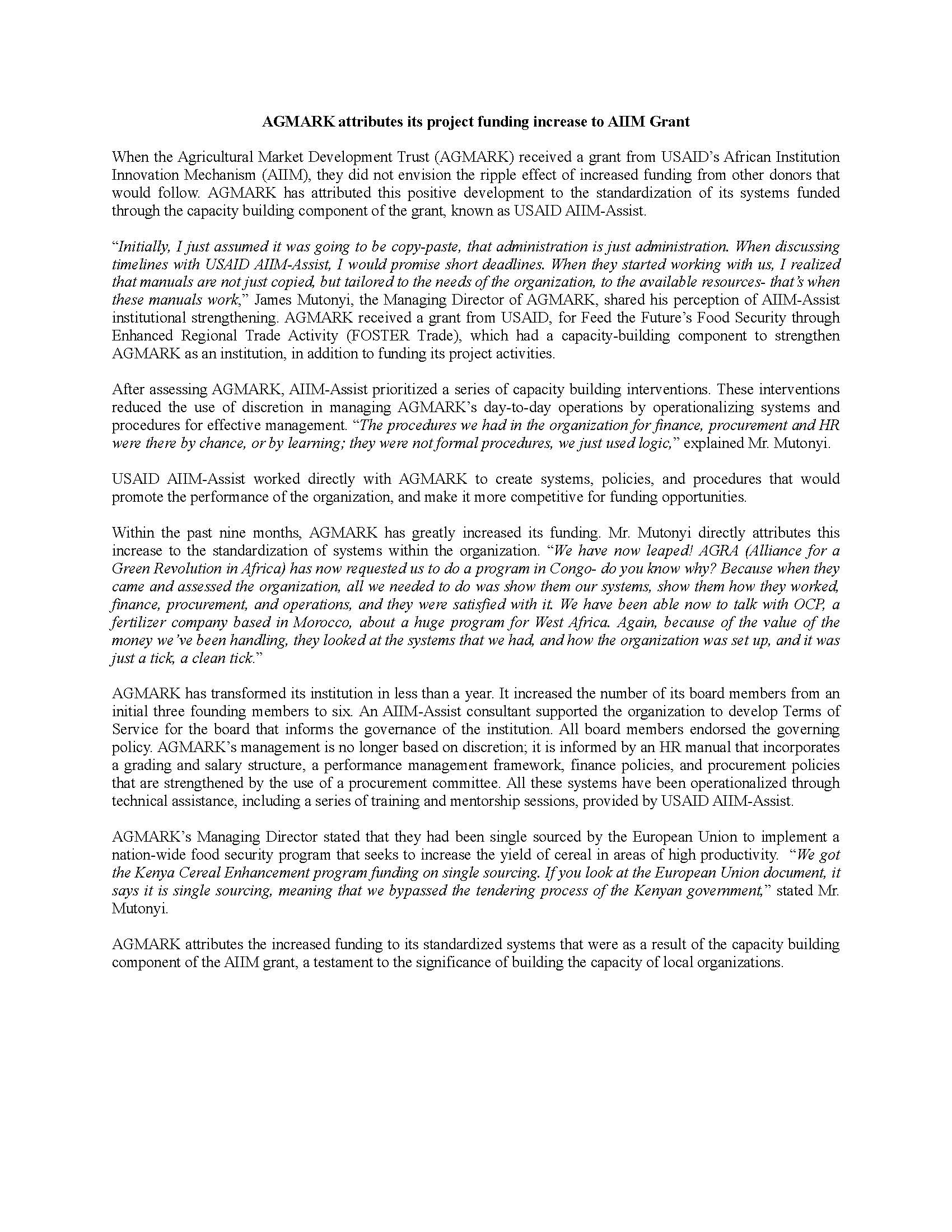Home » AGMARK attributes its project funding increase to AIIM Grant
When the Agricultural Market Development Trust (AGMARK) received a grant from USAID’s African Institution Innovation Mechanism (AIIM), they did not envision the ripple effect of increased funding from other donors that would follow. AGMARK has attributed this positive development to the standardization of its systems funded through the capacity building component of the grant, known as USAID AIIM-Assist.
“Initially, I just assumed it was going to be copy-paste, that administration is just administration. When discussing timelines with USAID AIIM-Assist, I would promise short deadlines. When they started working with us, I realized that manuals are not just copied, but tailored to the needs of the organization, to the available resources- that’s when these manuals work,” James Mutonyi, the Managing Director of AGMARK, shared his perception of AIIM-Assist institutional strengthening. AGMARK received a grant from USAID, for Feed the Future’s Food Security through Enhanced Regional Trade Activity (FOSTER Trade), which had a capacity-building component to strengthen AGMARK as an institution, in addition to funding its project activities.
After assessing AGMARK, AIIM-Assist prioritized a series of capacity building interventions. These interventions reduced the use of discretion in managing AGMARK’s day-to-day operations by operationalizing systems and procedures for effective management. “The procedures we had in the organization for finance, procurement and HR were there by chance, or by learning; they were not formal procedures, we just used logic,” explained Mr. Mutonyi.
USAID AIIM-Assist worked directly with AGMARK to create systems, policies, and procedures that would promote the performance of the organization, and make it more competitive for funding opportunities.
Within the past nine months, AGMARK has greatly increased its funding. Mr. Mutonyi directly attributes this increase to the standardization of systems within the organization. “We have now leaped! AGRA (Alliance for a Green Revolution in Africa) has now requested us to do a program in Congo- do you know why? Because when they came and assessed the organization, all we needed to do was show them our systems, show them how they worked, finance, procurement, and operations, and they were satisfied with it. We have been able now to talk with OCP, a fertilizer company based in Morocco, about a huge program for West Africa. Again, because of the value of the money we’ve been handling, they looked at the systems that we had, and how the organization was set up, and it was just a tick, a clean tick.”
AGMARK has transformed its institution in less than a year. It increased the number of its board members from an initial three founding members to six. An AIIM-Assist consultant supported the organization to develop Terms of Service for the board that informs the governance of the institution. All board members endorsed the governing policy. AGMARK’s management is no longer based on discretion; it is informed by an HR manual that incorporates a grading and salary structure, a performance management framework, finance policies, and procurement policies that are strengthened by the use of a procurement committee. All these systems have been operationalized through technical assistance, including a series of training and mentorship sessions, provided by USAID AIIM-Assist.
AGMARK’s Managing Director stated that they had been single sourced by the European Union to implement a nation-wide food security program that seeks to increase the yield of cereal in areas of high productivity. “We got the Kenya Cereal Enhancement program funding on single sourcing. If you look at the European Union document, it says it is single sourcing, meaning that we bypassed the tendering process of the Kenyan government,” stated Mr. Mutonyi.
AGMARK attributes the increased funding to its standardized systems that were as a result of the capacity building component of the AIIM grant, a testament to the significance of building the capacity of local organizations.
Issuing Country
Date
Monday, January 25, 2016 - 12:45pm








Comment
Make a general inquiry or suggest an improvement.